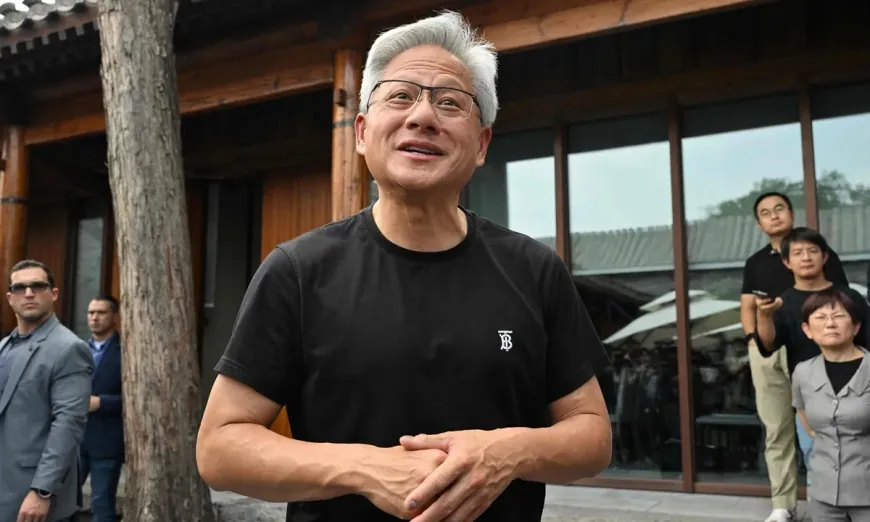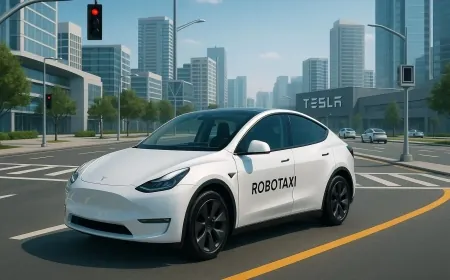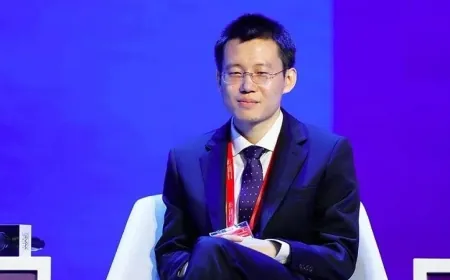Nvidia CEO Jensen Huang Clarifies Comment After Saying China Could Win AI Race
Nvidia CEO Jensen Huang said China is only “nanoseconds behind” the U.S. in artificial intelligence after his remark that China could win the AI race drew attention. He urged the U.S. to move faster to stay ahead.

Nvidia chief executive Jensen Huang has softened earlier remarks that appeared to suggest China would surpass the United States in artificial intelligence, saying the two countries remain nearly level in technological progress.
Huang’s comments drew attention after he was quoted as saying that “China is going to win the AI race,” a remark made on the sidelines of an AI industry summit. He reportedly pointed to China’s lower energy costs and fewer regulatory constraints as factors driving its rapid advancement in artificial intelligence.
Shortly after those remarks became public, Nvidia released a statement from Huang on social media, clarifying his position.
“As I have long said, China is nanoseconds behind America in AI,” Huang said. “It’s vital that America wins by racing ahead and winning developers worldwide.”
U.S. and China Remain Neck-and-Neck in AI
Huang has repeatedly described the AI race between the United States and China as being separated by “nanoseconds,” underscoring how closely matched the two nations are in computing power and innovation. He has argued that allowing Nvidia to sell its chips in China helps maintain American influence by ensuring China’s technology ecosystem remains tied to U.S. hardware and software.
That reasoning briefly gained traction in July when the U.S. government lifted restrictions on certain AI chip exports to China. However, the situation quickly changed as Beijing announced it would conduct a national security review of Nvidia’s chips, effectively halting their sale in the country.
Since then, Huang has confirmed that Nvidia’s market share in China has fallen to zero. Meanwhile, former U.S. President Donald Trump has reiterated that the company should not sell its most advanced chips to China.
China’s Policy Approach Gives It an Advantage, Says Huang
In his original comments, Huang suggested that Western nations — including the United States — are constrained by “cynicism” and heavy regulation surrounding artificial intelligence. He contrasted this with China’s approach, where the government offers energy subsidies that lower operational costs for companies developing or deploying AI models.
According to Huang, these policies allow China’s AI sector to scale faster and operate more efficiently, though he emphasized that American innovation still leads by a slim margin.
Nvidia’s Market Value Hits Record Levels
Nvidia has a major financial stake in the global expansion of AI. The company recently became the first in the chip industry to surpass a $5 trillion market capitalization, marking a new milestone for the sector.
Nvidia also announced a $1 billion investment in Nokia, part of its broader strategy to expand into telecommunications and networking technology.
The company’s shares have risen more than 41% this year, and are up over 1,200% in the past five years, driven by surging demand for its graphics processors that power most of the world’s AI training systems and data centers.
Huang Warns the U.S. Cannot Slow Down in AI Race
Huang said the United States still holds a narrow lead over China in artificial intelligence but cannot afford to slow its pace of development. He noted that China’s lower energy costs and strong state backing have helped its companies expand computing capacity faster.
He said America’s advantage lies in advanced chip design and research talent but warned that the lead could disappear without continued investment and policy support.
“The difference is measured in nanoseconds,” Huang said. “We have to keep pushing forward.”
Also Read: Top 3 AI Infrastructure Stocks Benefiting from Data Center Power Demands
































































